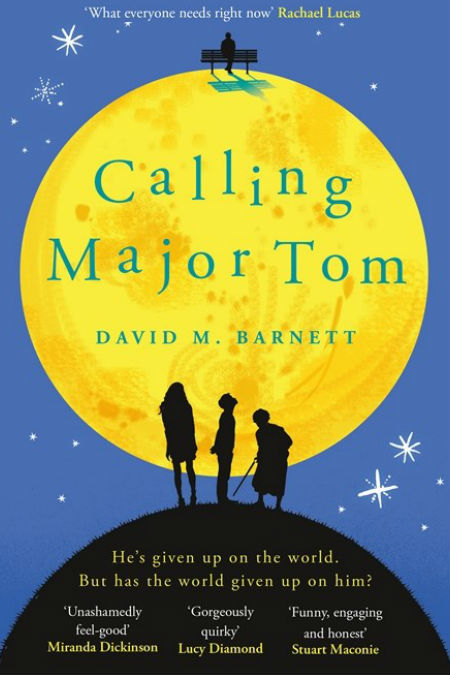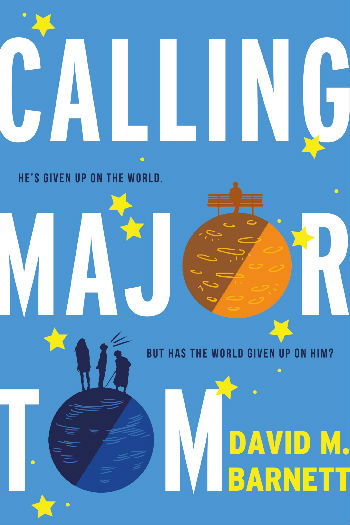
We live in a complicated, unforgiving world.
You only have to take even momentary stock of current events to realise that there is a great deal wrong with the world we live in and never enough help to be found for those who need it.
That’s why David M. Barnett’s Calling Major Tom is such an unmitigated joy and a necessary tonic for these troubled times.
Even as the book details many of the ills that afflict society from dementia to the death of the middle class, bullying to people co-opted into the ranks of carers far too early in life, it also offers hope that holding onto some semblance of hope is not as much of a fool’s errand as you might suppose.
Granted much of the relief handed to grandmother Gladys, and grandchildren Ellie and James verges on the fantastical and the far-too-convenient but then if you can’t have happily-ever-afters in a novel then where can you have them?
“All happy families are alike, but all bug-f**k stupid dysfunctional families are bug-f**k stupid dysfunctional in their own way, thinks Ellie as she sits on the benches outside the bank, sheltering from the desultory, spotting rain beneath some spindly trees, on the lookout for happy families. She imagines she’s a sniper … Every time she spots a happy family … Ellie’s Sniper Rifle of Truth hits them with her magic bullet.” (P. 32)
The thing is, Calling Major Tom is a feel-good novel that retains the power to uplift and inspire precisely because it is so grounded, nuanced and anchored to reality (admittedly with some winningly-articulated quirks).
Both the titular protagonist Thomas, a heavily-disillusioned 47-year-old man who has let bitterness and disappointment eat away at his soul and corrode any desire to be connected to the human race in any form that he seizes an opportunity to be the first man on Mars with unseemly alacrity, and Gladys, Ellie and James, are not exactly leading what you’d call charmed lives.
Ellie and James’ dad Darren, a good man still mourning the loss of his wife Julie four years earlier at the hands of a drunk driver, has ended up in prison, caught when he agreed to be the driver for a gang of a men he barely knew and the job, as they so often do, went wrong.
His absence has left 15-year-old Ellie as the primary breadwinner for the family, juggling three part-time jobs, school and the care of James and her Nan who, at 71, is finding herself ever more lost to the initial ravages of dementia.
The years when she should be going to parties – she goes to one with nascent boyfriend Delil at one point when everything has simply become too much but it’s not quite the escapist nirvana she envisaged – and chatting to friends on social media have been ceded to caring for her family and keeping a roof over their head and food in their bellies.
She doesn’t resent it and yet she does, caught between wanting to be a typical teenager and all too painfully aware that’s not even an option.

By a quirky miracle of happenstance – Calling Major Tom is quirky as hell without once feeling like it’s not firmly rooted in the realities of life – Thomas aka Major Tom by dint of his Bowie-fandom and the natural inclination of people to refer to an astronaut named Tom by his unwanted “Space Oddity” moniker, ends up talking to Gladys, Ellie and James on the phone in the last few weeks before his spacecraft, Ares-1 goes sailing out of range.
What begins as a wrong number when Thomas calls his ex-wife Janet’s last known address soon evolves, despite everyone’s expectations, into a relationship with the power to transform everyone’s lives.
As his contact with the Ormerod family increases and his affection for them grows, in complete contravention of his well-established “Bah humbug I hate everyone!” mentality, Thomas finds himself reliving a host of different memories, awash in the negative life experiences that triggered his withdrawal from the human race in the first place.
The more he comes to know Gladys, Ellie and James, and the more he realises he can do something to make their precariously-balanced lives better, the more he reassesses his own life, coming to appreciate, as he hurtles towards Mars never to return to Earth, that perhaps he didn’t handle his life as well as he might have and that being connected to other people and mattering to them, isn’t that bad after all.
“He still doesn’t know why he called what he thought was her [Janet’s] number, the one that got him through to Gladys Ormerod. He’d said his goodbyes. He’d made his peace. He thinks about it for a while, and decides that what he wanted to tell her was that she was wrong, he did know how to be happy, and this was it: leaving Earth, leaving them all behind, that was what made him happy.
“And now he realises that he is glad he never made the call, glad he got through to the Ormerods rather than her. Because otherwise, how would he know? How would he know that he was wrong? That suddenly, and crushingly, he wishes with all his heart that he’d never left at all.” (P. 252)
He certainly reassures Ellie and James particularly, both of whom are, for a multitude of reasons, thoroughly disillusioned and exhausted by life’s vicissitudes at far too young an age, that good things can still happen.
Time and again the family find themselves close to escaping the ravenous jaws of cruel fate only to find everything falling apart at the eleventh hour. But as Tom awakens once again to life’s possibilities, and makes a host of wonderful things happen for the beleaguered family, everyone begins to believe that maybe, just maybe, life may not be the one-way street to nowhere that it was beginning to uncomfortably resemble.
While Calling Major Tom verges slightly on kids’ movie twee at times, with everything a little bit too good to be true from overly-forgiving policemen to PR people willing to stare down their unsympathetic boss to the point of insubordination, any inclination to roll your eyes in disbelief is quickly stymied by the sheer delightfully heartwarming nature of it all.
Barnett has gifted his story with complex, rich characters and real world problems that don’t give an inch for any form of narrative contrivance, and so, when things finally turn around for everyone, including Tom, you can’t help but join in celebration with them.
Calling Major Tom is an unashamedly feel good festival of the human spirit, but much of its resonance comes from the fact that it tells it like it is every bit as much as it weaves the magic wand of possibilities, giving this tale of life redeemed believable substance and depth, and imbuing its happy ever after ending with the sense that it just might be possible in our often cruel and unforgiving world after all.

Thanks for the recommendation. Just downloaded the book on audible. 🙂
You’re welcome! It’s such a good read – quirky and substantial all at once. Hope you enjoy!
I did enjoy it. Very much. Excellent as audio book as well 🙂
Oh I’m glad! I’ve never really got into audio books but I can definitely see their attraction. Imagining in this instance, it would’ve made the book come even more alive 🙂